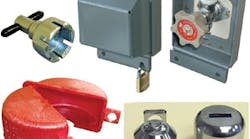Outdoor water fixtures are often overlooked during security planning – ironically. Their usual out-of-the-way locations make them vulnerable to theft, tampering, and vandalism. Due to the rising price of precious metals, metal fixtures are an especially attractive target for thieves who will steal the fixtures to sell them for scrap.
A recent theft of about 400 brass faucet fixtures from the Iowa State Fair campgrounds underscored this trend. Though some of the stolen faucets were later recovered, fair officials plan to replace the fixtures with functional, yet less expensive units with lower precious metal content, according to marketing director Lori Chappell.
"Metal theft is very prevalent right now in many areas to support the habits of drug users – specifically, users of methamphetamine," says security consultant Jeff Slotnick, regional vice president and vice chair of the physical security council for ASIS. "Metal is easily negotiated for currency."
To keep your fixtures safe, remember these 4 key security considerations:
1. Ensure Physical Security
Locking devices present an extra obstacle that thieves may not have the time or tools to overcome. Devices such as the Faucet Guard bolt a heavy steel housing to the building around an outdoor faucet; this housing locks with a padlock for an extra layer of security.
Multifamily housing and light commercial buildings with host stems coming from the wall may benefit from lockable caps, adds Katie Parris, marketing manager for The Part Works, Faucet Guard's manufacturer.
"Hydrants are a much overlooked piece," Parris says. "You'll find that they're broken or the ends of the stems are destroyed with pliers, and nobody worries about it. A lot of building owners would probably find they're losing water because of drips and leakage, particularly in older buildings where the whole stem assembly needs to be replaced."
2. Consider Construction
of Large Features
Large water features benefit from early pre-installation security considerations, Slotnick says. "Hygienically and appearance-wise, brass and stainless steel are probably more suitable," he adds. "But concrete is very difficult to pick up and haul away."
Replacing standard bolts with tamper-proof versions makes it harder to remove all sorts of fixtures, Slotnick says.
"It doesn't absolutely prevent the theft, but it makes it difficult, because the adversary has to have a complete different set of tools to remove the device," Slotnick says.
3. Keep Up Appearances
A well-kept property where damage and age are fixed quickly can act as its own deterrent, Slotnick says. The "broken window theory" posits that neglect breeds more vandalism because the perception is that no one cares, while a property where vandalism is quickly fixed shows that someone is watching.
"If you have properties that are neglected and poorly maintained, then people are more likely to vandalize those properties," Slotnick says. "That's why, when you see a wall that gets graffitied the first time, if nobody does anything, more taggers come. If you remove the graffiti, somebody's watching. Somebody cares."
4. Enable Security with Good Environmental Design
The principles of CPTED, or Crime Prevention Through Environmental Design, rely on structuring outside spaces to maximize protection from the physical environment. Open designs with few visual obstacles provide security for both property and people – clear lines of sight put important fixtures out in the open where anyone can see a theft in progress. Building occupants also feel safer when there are fewer places for potential assailants to hide.
Landscaping and lighting support this goal by ensuring good visibility, using such techniques as limiting shrubbery to a maximum height of 3 feet and maintaining even light.
"Generally, people don't engage in crime if they fear being caught," Slotnick says. "We're not trying to keep intruders out, we're trying to direct the flow of traffic. If you have a water fountain located next to a traffic route, then people are constantly walking past it, which makes it less desirable to someone who'd want to steal it because they're going to get caught." B
Janelle Penny (janelle.penny@buildings.com) is associate editor of BUILDINGS.



